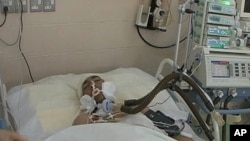As fighting continues between troops loyal to Libyan leader Moammer Gadhafi and opposition forces determined to oust him, the dead and the wounded fill hospitals. VOA’s Scott Bobb recently visited the main hospital in the opposition-held city of Benghazi, in eastern Libya.
It is late morning in the intensive care unit of Benghazi’s Jalah hospital. The pace never seems to slow . The staff copes with a constant flow of patients in and out of the 200-bed facility, the largest hospital in eastern Libya.
Nurse Cora from the Philippines, who does not want to give her last name, says that at the peak of the fighting several weeks ago, this hospital received up to seven dead a day and more than 10 wounded. Many were young people who had confronted government tanks.
"No words can describe what happened. We saw dead. We saw these patients come with only half a body because of this. It’s very horrible," she said.
Abdelrahman Ahmed is lying in a bed in a ward surrounded by his family. His body is wrapped from the shoulders to the toes in white bandages.
A 15-year old student, he joined the opposition forces east of Benghazi. He was burned over 90 percent of his body when pro-Gadhafi troops threw a fire bomb into his truck.
Ahmed says he is fighting because the Gadhafi government jailed his cousin 11 years ago and refuses to release him despite three court orders to do so.
He wants to return to battle. He says since he was born he could see that Mr. Gadhafi was a tyrant. He says the Libyan leader is always killing and oppressing and, "I am no better than the people who have already died for this cause."
The spokeswoman for the Red Cross, Iman Moankar, says the Benghazi hospital staff is so professional that her group has been able to withdraw its emergency teams from here. It now provides mainly surgical kits and medicine to this facility.
But she says conditions are desperate in the opposition-held city of Misrata, 200 kilometers east of Tripoli, and several towns west of Benghazi where the fighting is intense.
"Our priority is to have access to these areas affected by the fighting where humanitarian aid and humanitarian workers are not able to have a safe access to assess and address the needs immediately," said Moankar.
The head of health services for the opposition’s fledgling administration, Dr. Jabril al-Howeidi, says his hospitals can handle primary care, but not major injuries - bone fractures, head wounds and spinal injuries. He says they are receiving adequate medical supplies from international donors for now.
"Our medical supply, in general, it’s OK. But if this situation stays [persists] for more than one month, then we’ll be in crisis," he said.
In addition to the war wounded, the hospitals’ overworked staff must also deal with heart attacks, car accidents and other everyday cases.
Back in the ward, 26-year-old mechanic Awad Ajela also is covered in bandages. He was wounded in the same car bombing as Abdelrahman Ahmed.
He kisses a flag, independent Libya’s first flag that the opposition has adopted. He asks for it to be spread over him. He is desperate to get well so he can rejoin the resistance.
He says he is prepared to be burned three or four times again, and shed his last drop of blood, to get rid of Gadhafi.
Ajela and his friends are being transferred to a special burns hospital in Egypt. But their beds will soon be filled by new patients who arrive daily from the Libyan battle fields.
Hospitals Struggle to Care for Wounded in Libya Fighting




